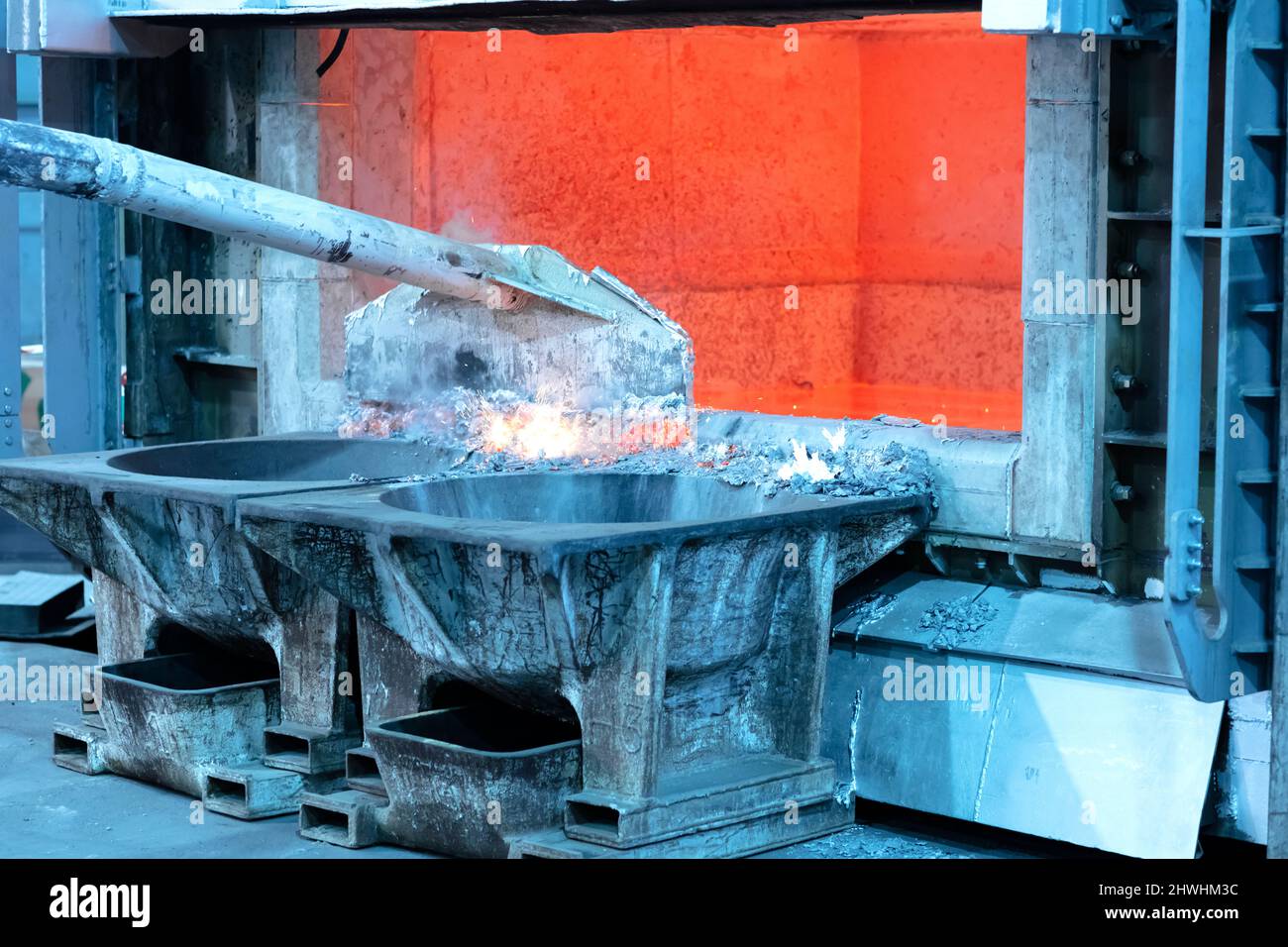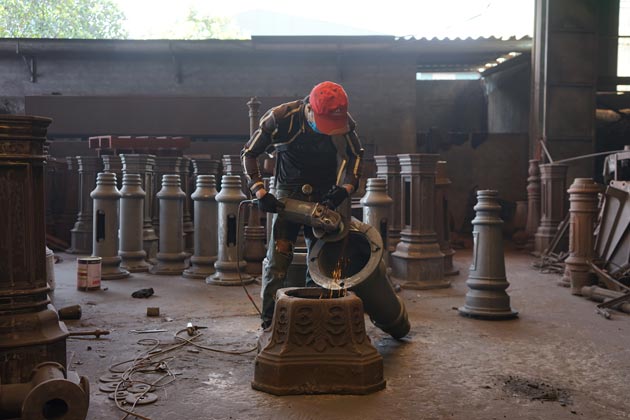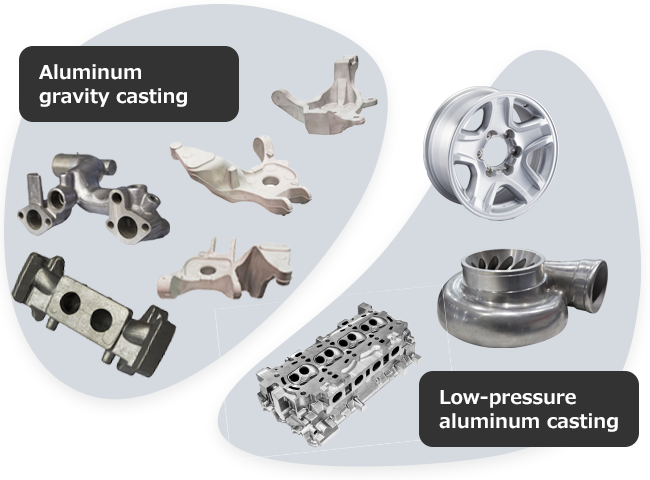Comprehending the Perks and Innovations in the Aluminum Foundry Sector
The Aluminum Foundry sector plays an essential duty in modern production. Its lightweight residential properties notably improve fuel effectiveness, particularly in automotive and aerospace markets. Furthermore, Aluminum's resistance to rust warranties long life in numerous applications. As the market progresses, advancements such as advanced recycling and additive production are reshaping production methods. Exploring these advancements exposes not just the advantages however likewise the difficulties in advance for Aluminum factories in a rapidly altering market.
The Lightweight Benefit of Aluminum
Aluminum's light-weight nature supplies substantial advantages throughout different industries, specifically in manufacturing and transportation. Its reduced density permits for the manufacturing of parts that are less complicated to deal with and set up, leading to minimized labor prices and enhanced efficiency. In the automobile market, lighter automobiles add to improved gas economy and lower discharges, lining up with international sustainability goals. Likewise, in aerospace, the use of Aluminum minimizes the overall weight of airplane, which is critical for boosting performance and lowering operational costs.
In addition, Aluminum's light-weight properties assist in ingenious designs that were previously impossible with larger materials. This adaptability makes it possible for makers to develop intricate forms and frameworks while keeping structural honesty. Generally, the lightweight advantage of Aluminum not only improves product efficiency yet likewise drives improvements in modern technology and style, making it a favored product in different applications.
Rust Resistance and Resilience
The Aluminum Foundry industry is renowned for generating products with exceptional corrosion resistance, making them perfect for different applications. This home, incorporated with boosted architectural honesty, adds to the resilient efficiency benefits that Aluminum elements use. Consequently, sectors progressively count on Aluminum to meet demanding environmental problems without compromising top quality.
Superior Corrosion Resistance
While different metals encounter considerable difficulties from environmental factors, Aluminum attracts attention for its exceptional corrosion resistance, making it a preferred selection in numerous applications. This building is largely as a result of a natural oxide layer that develops on the Aluminum surface, supplying a barrier against wetness and destructive agents. Unlike various other metals that might rust or degrade gradually, Aluminum keeps its stability even in harsh settings, such as coastal areas or industrial settings. Additionally, its lightweight nature combined with corrosion resistance makes it optimal for applications in aerospace, automotive, and marine markets. Generally, Aluminum's extraordinary toughness not just enhances item durability however likewise reduces maintenance costs, presenting a compelling benefit for customers and suppliers alike.
Improved Architectural Honesty
Developers and designers increasingly recognize the value of enhanced structural integrity in contemporary applications, where both deterioration resistance and resilience are essential. Aluminum alloys, known for their lightweight properties, likewise display remarkable resistance to rust, making them suitable for extreme atmospheres. The cutting-edge techniques employed in the Aluminum Foundry industry add significantly to creating parts with boosted longevity. Advanced casting procedures and alloy compositions are customized to satisfy specific efficiency requirements, ensuring that frameworks can hold up against extreme conditions without jeopardizing honesty. Surface treatments and coatings enhance the life expectancy of Aluminum products, further mitigating damage over time. This concentrate on enhanced architectural stability not just expands the usability of products however additionally decreases maintenance expenses, solidifying Aluminum's placement as a product of option in various sectors.
Durable Efficiency Conveniences
Resilient performance in Aluminum elements is mainly credited to their exceptional corrosion resistance and sturdiness. Unlike many steels, Aluminum normally forms a protective oxide layer, which protects against rust and degeneration in numerous settings, consisting of industrial and aquatic setups. This inherent home considerably prolongs the lifespan of Aluminum products, lessening maintenance and replacement costs. In enhancement, the lightweight nature of Aluminum enhances its applicability throughout markets without compromising stamina. The material's resistance to deterioration also contributes to its integrity in demanding applications, making it an optimal choice for automobile, aerospace, and building sectors. As industries significantly focus on sustainability and long life, Aluminum's efficiency benefits line up with modern-day design requirements, strengthening its role in cutting-edge manufacturing procedures.
Ecological Influence and Sustainability
 As the Aluminum Foundry sector evolves, it increasingly prioritizes ecological impact and sustainability, acknowledging the demand for accountable practices in the face of climate change. Initiatives to decrease waste and energy consumption are at the leading edge, with numerous factories taking on recycling efforts to reclaim Aluminum scrap. This not only minimizes raw material use yet additionally significantly cuts down power expenditure, as recycled Aluminum needs just a fraction of the energy compared to key production.
As the Aluminum Foundry sector evolves, it increasingly prioritizes ecological impact and sustainability, acknowledging the demand for accountable practices in the face of climate change. Initiatives to decrease waste and energy consumption are at the leading edge, with numerous factories taking on recycling efforts to reclaim Aluminum scrap. This not only minimizes raw material use yet additionally significantly cuts down power expenditure, as recycled Aluminum needs just a fraction of the energy compared to key production.Advancements in discharges manage modern technologies are being carried out to decrease air contaminants, aligning procedures with stricter environmental policies. Factories are additionally exploring alternative energy sources, such as solar and wind, to power their facilities sustainably. By cultivating cooperation navigate here with stakeholders, the industry aims to create ingenious solutions that improve eco-friendly stewardship. Collectively, these campaigns highlight a commitment to minimizing the Aluminum Foundry's carbon footprint while promoting a round economic climate within the manufacturing field.
Advanced Production Techniques
 Revolutionizing production processes, the Aluminum Foundry market is progressively integrating sophisticated manufacturing techniques to enhance efficiency and accuracy. Strategies such as computer system numerical control (CNC) machining and additive production have actually emerged as important components in enhancing production workflows. CNC machining permits high-precision component construction, significantly minimizing material waste and manufacturing time. Meanwhile, additive manufacturing opens brand-new avenues for complicated geometries and light-weight designs that were previously hard to achieve.
Revolutionizing production processes, the Aluminum Foundry market is progressively integrating sophisticated manufacturing techniques to enhance efficiency and accuracy. Strategies such as computer system numerical control (CNC) machining and additive production have actually emerged as important components in enhancing production workflows. CNC machining permits high-precision component construction, significantly minimizing material waste and manufacturing time. Meanwhile, additive manufacturing opens brand-new avenues for complicated geometries and light-weight designs that were previously hard to achieve.Additionally, the implementation of automation and robotics in Aluminum shops enhances procedures, reduces human error, and enhances employee safety. These innovations assist in an even more receptive manufacturing environment, enabling producers to adapt swiftly to market needs. The assimilation of advanced simulation software program further enhances the design and testing stages, resulting in exceptional product high quality. Jointly, these strategies not just improve operational efficiency but also foster advancement, placing the Aluminum Foundry market at the leading edge of contemporary manufacturing.
Technologies in Reusing Processes
The Aluminum Foundry industry is not just progressing in producing methods yet is additionally making substantial strides in recycling processes. Innovations are emerging to boost the performance of recycling methods, reducing energy intake and enhancing sustainability. Advanced sorting innovations, such as automatic optical sorting, enable the recognition and separation of Aluminum from various other products with high precision. This brings about a greater top quality of recycled Aluminum, which is vital for keeping the stability of the end products.
In addition, closed-loop recycling systems are being carried out, enabling producers to reuse Aluminum scrap within their very own manufacturing processes. This decreases waste and advertises a circular economy. Furthermore, study into new recycling strategies, such as hydrometallurgical processes, uses the possibility for recuperating Aluminum from intricate waste streams. These technologies not just add to minimizing the carbon footprint of the Aluminum Foundry market yet likewise bolster its financial stability in a progressively environmentally conscious market.
Applications Across Numerous Industries
Many industries are significantly recognizing the convenience and advantages of Aluminum Foundry products, resulting in prevalent applications across industries such as auto, aerospace, customer, and construction goods. In the vehicle industry, Aluminum pop over to this web-site castings add to lightweight lorry styles, improving fuel performance and efficiency. Aerospace makers utilize Aluminum parts for their strength-to-weight proportion, essential for airplane frameworks and components.
In building and construction, Aluminum is preferred for its toughness and resistance to corrosion, making it ideal for home window frameworks, roof covering, and architectural supports. Consumer goods also benefit from Aluminum Foundry products, as seen in cookware, electronics, and product packaging, where lightweight and recyclable products are essential.
The versatility of Aluminum Foundry methods permits detailed styles and precise requirements, satisfying the diverse needs of these sectors. Consequently, Aluminum Foundry items are ending up being important to contemporary production processes throughout various industries.
Future Trends in Aluminum Foundries
As sectors remain to develop, Aluminum shops are poised to embrace a number of key fads that guarantee to boost effectiveness and sustainability. One popular fad is the enhancing fostering of digital innovations, including automation and synthetic intelligence, which streamline operations and improve quality assurance. In addition, the push in the direction of sustainable methods is leading factories to purchase reusing innovations, greatly minimizing waste and energy usage.
 Another emerging trend is the use of sophisticated alloys and products, accommodating the growing need for durable and light-weight elements across various industries (Aluminum Foundry). The combination of additive manufacturing methods is anticipated to revolutionize component layout, providing personalization and minimizing lead times.
Another emerging trend is the use of sophisticated alloys and products, accommodating the growing need for durable and light-weight elements across various industries (Aluminum Foundry). The combination of additive manufacturing methods is anticipated to revolutionize component layout, providing personalization and minimizing lead times.Partnership with research organizations is likewise expected to drive innovation, as shops look for to create new processes and products. Aluminum Foundry. Jointly, these patterns indicate a transformative future for the Aluminum Foundry sector, straightening with more comprehensive objectives of sustainability and efficiency
Frequently Asked Questions
What Are the Common Expenses Connected With Aluminum Foundry Manufacturing?
The regular prices related to Aluminum Foundry production include raw materials, labor, power, tools upkeep, and overhead expenditures. These variables jointly affect the general monetary investment required for efficient Aluminum casting procedures.
Just How Does Aluminum Contrast to Various Other Metals in Strength?
Aluminum, while lighter than many steels, shows impressive strength-to-weight proportions. Contrasted to steel, Aluminum is less strong but offers excellent deterioration resistance, making it a desirable selection in applications where weight and resilience are important.
What Security Steps Are in Area in Aluminum Foundries?
Precaution in Aluminum factories typically consist of mandatory individual protective tools, air flow systems to control fumes, regular tools maintenance, training programs for staff members, and adherence to stringent safety regulations to decrease dangers related to molten steel handling.
Just How Is Quality Assurance Managed in Aluminum Spreading Processes?
Quality control in Aluminum spreading procedures includes extensive evaluations at numerous phases, consisting of raw product examination, process surveillance, and last item screening. Methods such as analytical process control and click here to find out more non-destructive testing warranty adherence to industry requirements.
What Certifications Are Very Important for Aluminum Foundry Distributors?
The value of qualifications for Aluminum Foundry providers consists of ISO 9001 for top quality administration, ISO 14001 for ecological monitoring, and industry-specific standards like ASTM and SAE, making sure conformity, safety, and dependability in making procedures.
The Aluminum Foundry industry plays an important duty in modern manufacturing. The Aluminum Foundry industry is renowned for creating products with premium corrosion resistance, making them suitable for numerous applications. Changing manufacturing processes, the Aluminum Foundry industry is increasingly integrating advanced manufacturing strategies to improve performance and precision. The Aluminum Foundry market is not only advancing in producing methods yet is additionally making significant strides in recycling processes. As sectors continue to evolve, Aluminum foundries are poised to embrace numerous key fads that promise to enhance performance and sustainability.